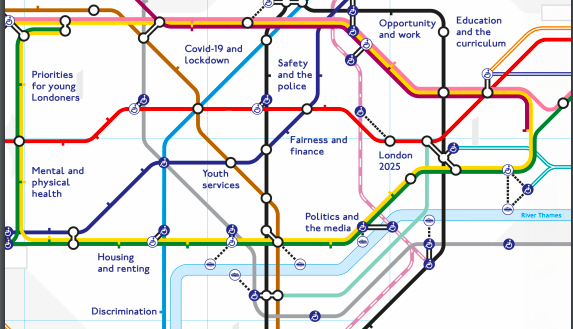80% of young people face Mental Health issues as Covid-19 significantly impacts Housing, and Employment
Partnership for Young London has launched the report: ‘Mapping Young London’ and the ‘London G-Z,’ an accompanying literature review of research about Gen-Z in London.
The research was conducted by Partnership for Young London, London’s regional youth unit, and is a collaboration across a range of partners who have gathered data and insight on young people’s needs across London. The full list of contributors is in the posted at the end of this press release. ‘Mapping Young London’ has been co-designed with young people, using an extensive survey and focus groups that spoke to over 1,600 young Londoners aged 16-25. The young people surveyed have a broad range of lived experiences.
Key Findings:
- Almost 80% of respondents felt that Covid-19 and lockdown have had a negative impact on their mental health.
- Over a third (34.4%) of young people fall into the bottom quartile of the WHO 5-point scale for mental health, indicating they may show signs of depression.
- We asked how young people would rate the government’s response to coronavirus, with almost half saying it was very bad (46.6%), and a third saying it was bad (29.6%)
- Just less than half (47.5%) said that they somewhat, or mostly, trust the police.
- A third of young people (31%) said that Covid-19 and lockdown had negatively impacted their housing situation. Care-experienced (44.4%) young people and those who considered themselves to have a disability (44.2%) were more likely to be negatively impacted, showing that those deemed more vulnerable within society were most impacted by the pandemic.
- Half of the young people we surveyed (51.4%) said that their future employment plans had changed as a result of Covid-19 or lockdown.
Alarmingly, the report highlights the extent to which one of the hardest years in recent history has had on the younger generations. 80% of young people said that Covid has had a significant impact on their mental health. The findings also show that over a third (34.4%) of young people fall in the bottom quartile of the WHO 5-point scale for mental health, indicating they may suffer from depression. Young people who said that Covid-19 had a negative impact on their mental health were far more likely to have lower well-being scores.
Given the range of issues they faced, it is unsurprising that young people were unsatisfied with the government’s COVID response. Half rated the response as very bad (46.6%), with and a third saying it was bad (29.6%). Only one in a hundred (1.2%) said that the government’s response was very good. Those who spent far more time online were almost three times more likely to say the government’s response was very bad, compared to those who spent less time online (70.6%).
The findings regarding safety and the police were very telling as (83.8%) said that they agree that there is still systematic racism in the police, with (54.4%) strongly agreeing. Just less than half (47.5%) of young people we spoke to said that they somewhat, or mostly, trust the police, compared to around a third (30.8%) who said they distrust or mostly distrust the police. Black young people were the least likely group to somewhat or mostly trust the police (22.1%), with White young people and Asian young people the most likely (54.7% and 54.2% respectively).
In 2020 young Londoners also faced setbacks with their housing and employment. 40% found that Covid massively impacted their housing situation with Care Leavers and Disabled young people being disproportionately affected. Black and Asian young people were twice as likely to seek support with their housing from the local council. On employment, half of the young people we surveyed (51.4%) said that their future employment plans had changed as a result of Covid-19 or lockdown. Young people aged between 22 – 25 were more likely to have had their employment affected by the pandemic, this was expected as young people were more likely to have been furloughed or out of work.
The London G-Z: Guide to Gen- Z, is a literature review of research about Gen-Z in London. This research outlines approaches as to how we design youth policy and young people’s services.
Keith Bottomley Chair of Trustees, Partnership for Young London Comments:
“I really welcome this report which captures so many insights from young Londoners, the data gives a stark overview of the inequalities across our City, it highlights the disproportional impact that Covid19 has had on young people. I strongly feel that all policy makers and practitioners should use this when they are looking at London’s Recovery from the pandemic, we must put young people’s voices at the core of future planning to make sure we create a fairer and more equal London.
This report is collection of data from us and a huge range of partners which illustrates how London’s youth sector collaborates and works in partnership to drive up outcomes for young people.”
Bharat Mehta CBE, Chief Executive, Trust for London Comments:
“The pandemic is having a profound impact on young people in London. Too many are experiencing unacceptable hardship across education, work, housing and mental health, at some of the most important junctures of their lives. But as this report shows, organisations can collaborate with young people, putting their lived experience at the heart of the response, helping to develop solutions that will create a better future for young Londoners.”





